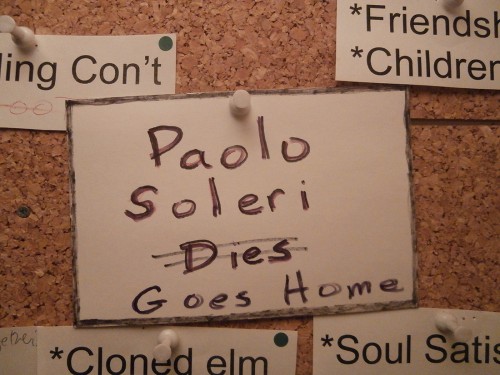I met G., a writer friend, at an artist residency in November 2012. At this residency I showed the 36-minute sample of A Life’s Work to G. and the other residents. G. said to me privately afterwards, I’d really like to speak about your film. It never happened at the residency, but a couple of weeks ago we met up for coffee, two years later.The film stayed with me, he said. We spoke about the gospel music in the film and somewhere in there the phrase “going home” was used. (“Gone home” is a common expression used in gospel music, a way of saying one went back to the Creator.) I told him since he saw the sample Paolo Soleri had died and it threw me into a depression. I don’t know you that well, he went on diplomatically, and I don’t know what inspired the film, and the film might have changed since I saw it, but I think that maybe what I saw was too heavy on the grief and didn’t celebrate enough the joy of being part of continuum, which, not to be presumptuous, might be what you’re going for. This absolutely blew my mind. It was perhaps the single most insightful and useful criticism I’ve heard about the work-in-progress. I went home and edited one of the index cards on my cork board.

I’m not sure how Soleri, who was not what you’d call a religious man, would feel about this, he probably would not approve, but it comforted me some and the card is now a reminder to shift the focus a little bit. But this card also brings up an interesting question: If I put some transcendent gospel music over the bit of the film that deals with Soleri’s death, am I somehow betraying him? What do you think?

MEHope
Is the film sort of a memoir of the filmmaker also? Do the elements come together to explain their drive as well as yours? Fitting? Appropriate? Gone home, doesn’t mean in strictly that religious “heaven” type thing, but back to the earth as well, where he wanted us to live and not be afraid to be part of; no betrayal, just more honor for someone who means so much.
David Licata
I didn’t expect this post to inspire such wonderful comments.
Thank you M.E. Hope and Robert Darden.
I suppose it will also depend on the song chosen.
But I like the idea of the song being celebratory (which is in keeping with shift in focus) and the song honoring the man. Soleri loved music, used music metaphors often, so I think, yes, perhaps he wouldn’t mind at all.
Robert Darden
Obviously, I’m biased. But if the greater chronicler of gospel music — Anthony Heilbut, an agonstic — believes in the transcedence of the best gospel music, then I suspect Paolo wouldn’t mind. It’s celebratory music!
David Licata
Thanks, Robert. As always, it’s such a pleasure to see your name here.
Hope all is well with you and yours.
(I addressed your comment along with M.E. Hope’s, thought I was being efficient, but actually I wasn’t, was I?)
Nathan Koren
Hmmm, I’m not sure.
When it came to spirituality, I found Paolo to be quite contradictory, at least to outward appearances. He despised religion, but much of his life’s work was clearly motivated by the religious traditions and impulse. When you start talking about Omega Seeds and Omega Points, you’ve left both empirical science and logical philosophy behind, and are playing on spiritual turf, however vigorously you profess your “realism”.
Personally, I always found it to be an utter gamble as to whether a spiritually-hued sentiment would push his anti-religion buttons or tap into his wistful appreciation of the dreaming philosopher-priest. I remember when he came back from seeing Baraka, for example — it wasn’t clear whether he hated the movie itself, or just what the movie depicted, but his primary takeaway was that it showed how utterly destructive and pointless religion is. I was surprised, as my takeaway from that film had been entirely different, but to each their own.
Would he object to gospel music? I have no idea; he might or might not — and if he did, would probably couch that objection in anti-religious terms — although I suspect that in fact it would be based on his cultural and personal familiarity and tastes with regards to Gospel music. He’d probably say something different about Mozart’s Requiem, which is hardly secular…
That said, I don’t think he’d disagree at all if one said that the bridge between matter and spirit is bi-directional, and is indeed a bridge which everyone must cross twice.
David Licata
I had a drawing teacher who used to say “people are complicated.” I suspect Paolo was more complicated than most.
Thanks for the comment, Nathan! Good to see around these parts.
(Nathan was a resident of Arcosanti. He wrote a wonderful post for this blog — Arcosanti — City on the Edge of Forever. The post also includes some spectacular photos Nathan took of Arcosanti.)